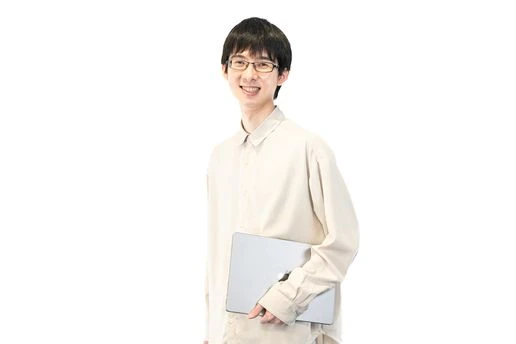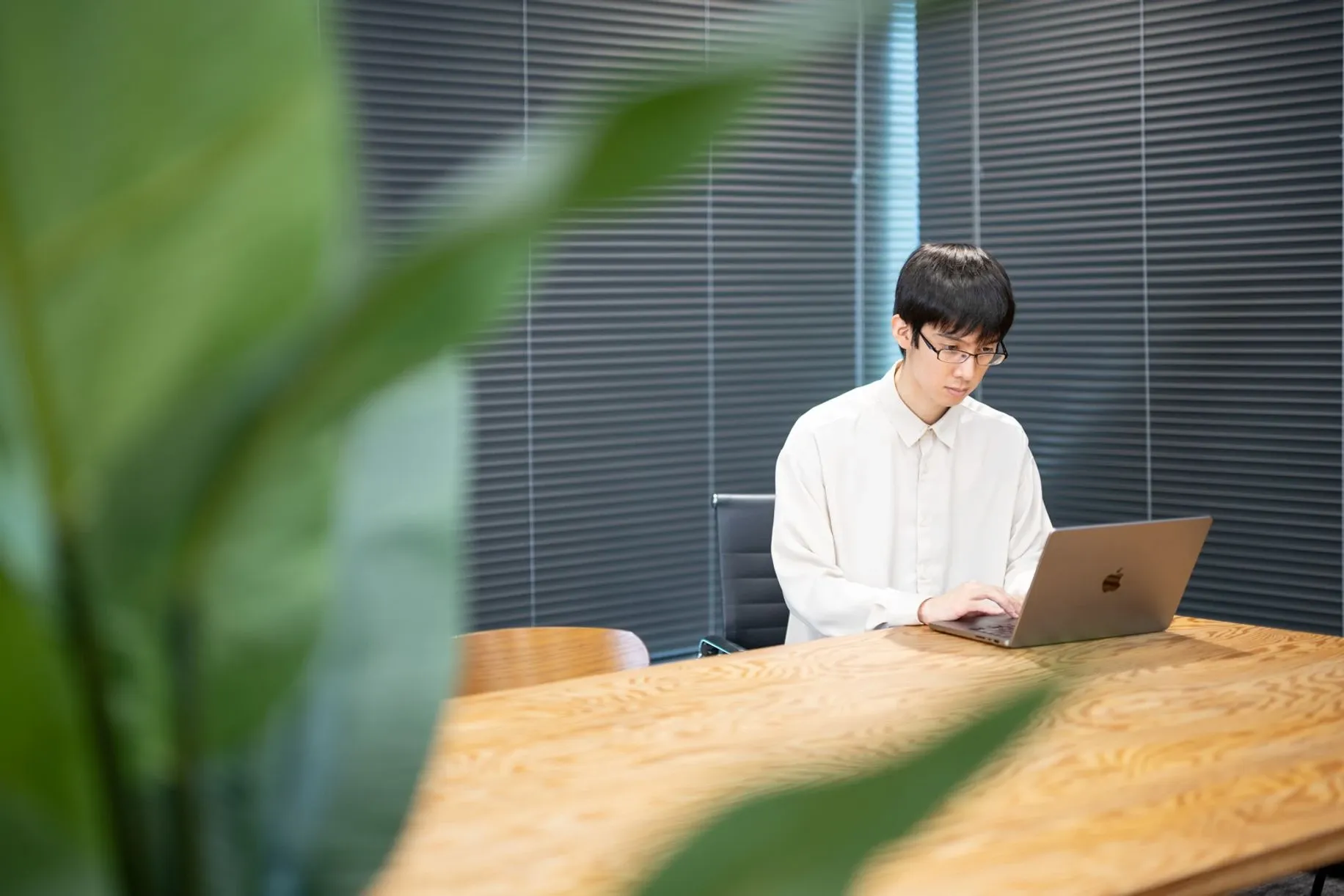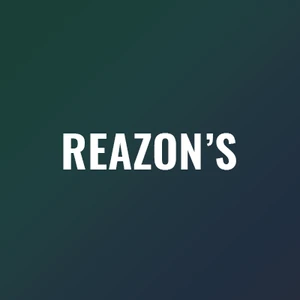As an engineer at Reazon the possibilities are limitless.
.jpg?width=1832&height=1220&fit=cover&format=webp&quality=90)
Hello, I'm Akaiwa from the Corporate Planning Division This time, I had the opportunity to speak with Mr. Kubota, who is involved in the development of the food delivery service "menu". Mr. Kubota, who is in his second year with the company, is responsible for organizing and operating engineer training programs for new employees while realizing the microservice organization of the programming code for "menu". He talked about his research during his student days, the joys of his work, and his future vision. The content is valuable not only for engineers but also for those outside the field, so I hope you'll take a moment to read it.
INDEX

Hiroshi Kubota Development Department, Infrastructure Development Team menu
Hiroshi Kubota graduated from the Department of Physics and Engineering at the University of Tokyo. During his university days, he was a member of an engineering training organization, where he honed his programming skills. Drawn to an environment where he could challenge what he wanted to do with a sense of speed, he joined Reazon as a new graduate in 2022. He works on establishing the development environment for the food delivery service "menu", and is involved in the microservice organization to enhance user experience. Additionally, since 2023, he has been planning and operating engineer training programs for new employees, contributing to the development of his juniors.
Attracted to an environment where I could actively drive movements, I joined Reazon after graduating.
.png?width=160&height=160&fit=cover&format=webp&quality=90)
After graduating from university, you joined Reazon as a new graduate, Kubota-san. What did you study during your university days?
.jpg?width=160&height=160&fit=cover&format=webp&quality=90)
I was researching a computer that operates on a new principle called 'superconducting quantum computer'. We aimed to achieve processing speeds where even complex calculations that take a long time on the computers we usually use could be solved instantly. With the development of 'superconducting quantum computers', there's the potential for calculations that take hours on giant supercomputers to finish instantly.
.png?width=160&height=160&fit=cover&format=webp&quality=90)
You were learning cutting-edge technology! Did you also study programming at university?
.jpg?width=160&height=160&fit=cover&format=webp&quality=90)
My department didn't offer programming classes, so I had to self-study when it became necessary for my research. By chance, I joined a tuition-free engineering training organization called '42Tokyo' that I found on social media and learned about programming there.
In typical programming schools, students often create services similar to websites or existing services (such as making a Twitter clone), but in this organization, there were many tasks related to the fundamental aspects of computers, allowing me to delve deeper into programming. Also, there were no teachers; instead, we reviewed each other's assignments among the students, sharpening our teamwork and problem-solving skills while striving together. It was very enjoyable, almost like working on actual projects, and it made me want to enter the workforce rather than pursue graduate studies.
.png?width=160&height=160&fit=cover&format=webp&quality=90)
I see you learned programming in an advanced environment. Did you not pursue graduate studies after all?
.jpg?width=160&height=160&fit=cover&format=webp&quality=90)
Originally, I had planned to pursue further studies and had even passed the entrance exam. However, during my graduation research, the COVID-19 pandemic hit, making it difficult for me to enjoy my research. I began to wonder if I really should continue my studies. With the policy of not allowing more than two people to enter the laboratory at a time, I couldn't casually consult with my seniors, and I felt lonely. Also, I found joy in participating in campus festivals, part-time jobs, and internships, and I strongly felt the desire to contribute to society while working, so I decided to start job hunting.
.png?width=160&height=160&fit=cover&format=webp&quality=90)
What kind of companies were you considering during your job search? And why did you choose Reazon among them?
.jpg?width=160&height=160&fit=cover&format=webp&quality=90)
During my job search, I focused on large SI (System Integration) companies where I could work on large-scale projects and mega-venture IT companies where I could enhance my engineering skills. Although I received job offers from several companies, I chose Reazon because I felt that the company's size would allow me to actively drive movements, and I was satisfied with the benefits. Of course, large companies have more resources and opportunities to work on impactful projects, but compared to venture companies, I felt that there was less speed and freedom. During the interview at Reazon, I remember being told, 'If you have something you want to do, feel free to challenge it,' and I thought it would be enjoyable to grow while being able to try things freely.
.jpg?width=1832&height=1832&fit=inside&format=webp&quality=90)
Accelerating the input and output cycle to create new mechanisms
.png?width=160&height=160&fit=cover&format=webp&quality=90)
You were attracted to an environment where you could actively challenge yourself. What kind of work are you currently doing?
.jpg?width=160&height=160&fit=cover&format=webp&quality=90)
Currently, I am working on the microservice transformation of 'menu'. As the service expands, the programming code has become very complex, and engineers are in a situation where they have to spend time deciphering complex code to develop. Also, when adding new features, there is a risk of unexpected side effects causing bugs, which may disadvantage users.
Therefore, to improve development efficiency and enhance the quality of the service, we are working on microservice transformation. We are dividing the complexly intertwined code and systems into small multiple systems and refactoring them into code that is easy to read and less likely to cause side effects.
.png?width=160&height=160&fit=cover&format=webp&quality=90)
In microservice transformation, how do you decide on the criteria for splitting the system?
.jpg?width=160&height=160&fit=cover&format=webp&quality=90)
For example, we split the system by parts such as stores, users, delivery personnel, and maps. We decide where to draw the line while listening to discussions with stakeholders of the menu business. We proceed while listening to how delivery personnel use the app, what data would make it easier for sales to promote, and other actual usage and requests.
.png?width=160&height=160&fit=cover&format=webp&quality=90)
menu' seems to be evolving even further! Please tell us about the appeal of working in the menu business.
.jpg?width=160&height=160&fit=cover&format=webp&quality=90)
To realize microservice transformation, we have to constantly study and apply that knowledge to our work immediately, creating a cycle of rapid days. Also, because the knowledge I catch up on directly relates to my work, I feel a great sense of fulfillment.
.png?width=160&height=160&fit=cover&format=webp&quality=90)
What kind of studies are you actually doing?
.jpg?width=160&height=160&fit=cover&format=webp&quality=90)
I actively participate in external study groups. Various study groups such as conferences held by companies and conferences by engineers knowledgeable about Go language (*1) are regularly held. I attend conferences on themes that seem useful for microservice transformation about twice a month, both online and offline.
In addition to books, I also refer to information on blogs and social media where engineers and IT companies share case studies. Microservice transformation is creating mechanisms from scratch, so it's easy to introduce new technologies and ways of thinking.
*1. Go language: A programming language developed by Google, familiar as a search engine.

Challenging the planning and operation of new graduate engineer training in the second year of employment
.png?width=160&height=160&fit=cover&format=webp&quality=90)
I heard that you are also involved in new employee training.
.jpg?width=160&height=160&fit=cover&format=webp&quality=90)
Although it's my second year at the company, I am responsible for designing and operating the engineer training curriculum. To be honest, there wasn't a clear curriculum for the engineer training I received as a new employee, so I thought there was room for improvement. Also, if Reazon aims to be the world's number one company, the technical skills of engineers must also be world-class, so I felt that we should aim for further improvement.
So, I presented to the head of the development department, saying, 'I would like to do this kind of theme with this kind of curriculum,' and he said, 'I leave the training to you.'
.png?width=160&height=160&fit=cover&format=webp&quality=90)
Indeed, it's an environment where you can challenge yourself freely if you have something you want to do. What specific curriculum did you create?
.jpg?width=160&height=160&fit=cover&format=webp&quality=90)
Immediately after joining the company, there is a general training for all occupations, followed by engineer-specific training, which I designed. We learned the basic knowledge of various fields related to Reazon's business, and then we conducted a hackathon to create a product with 3 teams of 3 members each and determine the winner. We designed a schedule to do this over about 2 and a half months.
Let me briefly introduce the specific training contents.

.jpg?width=160&height=160&fit=cover&format=webp&quality=90)
I collaborated with several engineers, including the department head, from the planning stage to the operation of the engineer training. We discussed to determine the theme of the training, but in the end, we agreed with the idea of 'wanting engineers who can do anything.' We set up a schedule where participants could learn the minimum necessary knowledge in various fields related to Reazon's business, aiming to expand their possibilities as engineers.
I mainly handled the basic engineer training and backend training, while other members who were knowledgeable and experienced in their respective fields helped with other training. The hackathon held at the end was very exciting, and when I saw the new employees create a product solidly, I was very happy, and we shared the joy with the training members.
.png?width=160&height=160&fit=cover&format=webp&quality=90)
This training will undoubtedly push forward the growth of Reazon's engineers! Did you make any efforts when considering the engineer training?
.jpg?width=160&height=160&fit=cover&format=webp&quality=90)
I trusted each member who was involved in the training and consciously lowered the management cost while entrusting everything else after deciding on the minimum necessary conditions. Since everyone who cooperated in the training was an excellent engineer, I knew that they would give high-quality lectures without having to ask for specific lecture contents.
.jpg?width=1832&height=1832&fit=inside&format=webp&quality=90)
Broadly engaged in various businesses, I want to expand the possibilities as an engineer
.png?width=160&height=160&fit=cover&format=webp&quality=90)
I see that it was possible to achieve high-quality training precisely because there was a trusting relationship within the team.
So, what do you think is the value of Reazon for you, Kubota-san?
.jpg?width=160&height=160&fit=cover&format=webp&quality=90)
As I was entrusted with the new employee engineer training in my second year, it shows that the biggest value is being able to challenge freely if you raise your hand to do something, regardless of your years of service.
And I also like the company culture where "failure in a challenge is not blamed." When I was entrusted with the training, I was told, "The task itself has value, so it's okay to fail. However, don't give up and finish it to the end," which greatly relieved me and made me feel like I could try my best until the end.
In the menu business as well, I am actively involved in the infrastructure construction necessary for microservice transformation. After being instructed on the minimum necessary tools to use, I am allowed to freely try what I think is good. It's an environment where if you have the courage to assert yourself properly, you can do anything, and I feel that it's a workplace where you can expand your possibilities.
.png?width=160&height=160&fit=cover&format=webp&quality=90)
Then finally, could you tell us about your future goals?
.jpg?width=160&height=160&fit=cover&format=webp&quality=90)
I want to become an engineer who is good at verbalizing. For example, when asked to create a certain service, the requester should have a vague image of the service, and an excellent engineer draws out the requester's thoughts through conversation, accurately verbalizing and organizing the information about the issue. If you can properly verbalize the problem and information, you can usually solve most problems, and you can also use AI tools for automatic programming. I think it's a skill close to communication, but I want to strengthen that point and realize the requester's thoughts.
Also, once the menu business settles down, I would like to try my hand at the game business. Games are constantly releasing new titles, and they use a lot of challenging technology. While being stimulated in a wide range of fields, I want to improve my skills as an engineer.
.png?width=160&height=160&fit=cover&format=webp&quality=90)
We are looking forward to what you have in store for us!
Thank you for your time today!
.jpg?width=1832&height=1832&fit=inside&format=webp&quality=90)
Please feel free to contact us about REAZON’S content, interviews, and press relations.
CONTACTIf you are interested in REAZON HOLDINGS, please check the recruitment site for more information.
RECRUITI crave excitement. I want to challenge myself. That's been the driving force behind my career journey.

The freedom of culture and a passion for "menu"; Propelling service to the next level, and the challenge of a fourth-year employee.

